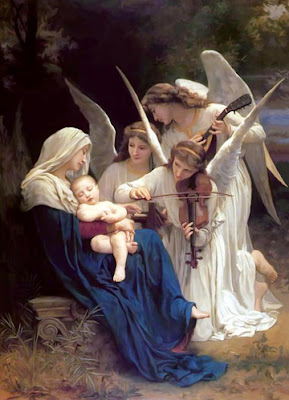Catholicism and Cool Stuff
One of the attractive things about Catholicism is that, traditionally anyway, it has always included a lot of Cool Stuff: gorgeous music and art (a sampling of which I try to showcase on my blog), beautiful churches in which to worship (which are themselves filled with inspiring images), ancient, uplifting prayers with which to praise our creator, and on and on. There's a vast treasury of beauty, and you can see it, hear, touch it, even smell it. It's all wonderful but . . . is it really necessary?
Many non-Catholic Christians and, sadly, even a substantial number of self-identified Catholics, dismiss these tactile and aesthetic riches as pointless frippery. Many others recognize their power, but misunderstand their purpose. John Adams, for instance, one of my favorite figures from American history but a man whose formation was thoroughly protestant, once witnessed a Catholic Vespers service when the delegates at the Constitutional Convention in Philadelphia decided to take turns attending each other's churches. He was impressed by the impact of the vestments, incense, and chanting, but also highly suspicious of its purpose, remarking "How did Luther ever break the spell?"
Now, it's no surprise that somebody like Adams, raised in a worldview grounded in Puritanism, should mistrust and misunderstand the aesthetic aspects of Catholic worship, but we should expect better from our fellow Catholics, particularly those who design churches, plan liturgies, and compose or arrange music. In another recent post [here] we saw how beautiful, well-ordered churches help to teach the Faith. Today I'd like to discuss in more depth how aesthetic experiences (both inside and out of the church building) can deepen our faith and even, in some cases, help bring the unbelieving to belief.
It's a Matter of Trust
Before I go any further, I'd like to stress that bringing about conversion is primarily the work of the Holy Spirit. Our Lord still wants us to play a role, however:
Go therefore and make disciples of all nations, baptizing them in the name of the Father and of the Son and of the Holy Spirit, teaching them to observe all that I have commanded you (Matthew 28:19-20).
A significant part of that teaching should be directed toward opening minds and hearts so that people are prepared to trust Christ and his message.
And "Trust" is the key word. In my post "Star Trek, Secularism, And Christian Faith" [here] we looked at another passage from Matthew, in which Jesus walks on the water and then invites Peter to do the same; we saw that when Peter sinks into the waves, it was not so much from a lack of belief as a lack of trust (Matthew 14:25-32). Trust of this sort doesn’t come easily: how quickly Peter, who was a close friend of Jesus, wavered in his faith. How many of us ordinary believers, even those of us who have had powerful and convincing encounters with the power of God, have found ourselves beginning to doubt, and starting to drift away? This is, I think, one of the ongoing effects of original sin: that we are prey to doubt, and our emotions can overwhelm our understanding.
If believing Christians can be drawn into doubt, what about people with even stronger emotional incentives to disbelieve? There are those who hope to indulge their favored sins without guilt, for instance, or who work in a profession (such as academia) or live in an environment where Christian Faith marks them out for ridicule and abuse; there are an enormous number of people who know little about the history or teaching of the Catholic Church except the misrepresentations of an uninformed and often hostile popular press; there are those who really have been harmed, or are close to somebody who has been harmed, by someone they identify with Christianity or with the Catholic Church.
The Object of Opening the Mind . . .
 |
| William-Adolphe Bouguereau's "Song of the Angels" |
G. K. Chesterton once said: "The object of opening the mind, as of opening the mouth, is to shut it again on something solid." An important purpose of so many of the tangible and beautiful things in Catholic worship, all the chanting, vestments, smells and bells, is to expand the imagination so that our minds are opened large enough to receive the Gospel of Jesus Christ.
There is, of course, a danger in reliance on the imagination: it can expand the mind in other, less wholesome, directions as well. The well-meaning but misguided creators of Star Trek, for instance, are just the tip of the iceberg, and much, perhaps most, of what else is on offer in the popular culture is considerably worse. Like our conscience, then, imagination must be properly formed. We should take seriously the power of works of imagination, both for good and for bad, always bearing in mind St. Paul's advice: "Finally, brethren, whatever is true, whatever is honorable, whatever is just, whatever is pure, whatever is lovely, whatever is gracious, if there is any excellence, if there is anything worthy of praise, think about these things" (Phillipians 4:8). We might wish to remember the Apostle's words, and feel no guilt when we enjoy the beauty of Catholic music, art, or worship.


No comments:
Post a Comment